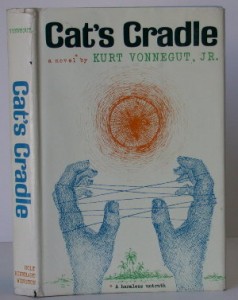 In his 1963 novel Cat’s Cradle, science fiction writer Kurt Vonnegut introduces a fictional polymorph he calls “ice-nine.” According to Vonnegut, ice-nine is an alternative structure of water that is solid at room temperature. It acts as a seed crystal which, when it comes into contact with liquid water below 45.8° C, causes the rapid freezing of the entire body of water.
In his 1963 novel Cat’s Cradle, science fiction writer Kurt Vonnegut introduces a fictional polymorph he calls “ice-nine.” According to Vonnegut, ice-nine is an alternative structure of water that is solid at room temperature. It acts as a seed crystal which, when it comes into contact with liquid water below 45.8° C, causes the rapid freezing of the entire body of water.
In Cat’s Cradle “Papa” Monzano, the badly ailing dictator of the mythical island of San Lorenzo, while dying of inoperable cancer commits suicide with ice-nine—touching it to his body and thus freezing into a block of ice. When an airplane crashes into the dictator’s seaside palace, the unlikely accident plunges his frozen body into the sea; and all the world’s oceans, rivers and ground water are turned to ice.
Since publication of Vonnegut’s Hugo Award-nominated work, “ice-nine” has been used as a metaphor for anything that converts other things to more of itself.
And that’s where WE come in. In the daily push-and-pull of life, our attitudes and demeanor are rubbed off on the people we meet.
- Smiling mothers beget smiling, cooperative children.
- Bosses who approach their work with energy and commitment inspire the same diligence in their employees.
- Friendly neighbors are the “glue” that strengthens a community and creates a nurturing environment where young and old alike can feel safe and welcomed.
- Good teachers infuse their students with a love of learning.
- And Christians—those erstwhile people along the journey toward perfection, followers of Jesus of Nazareth who both imitate and mirror His virtues—should inspire others around them to become more gentle, more loving, more kind.
In reality, we are the “ice-nine” of the universe.
Do you remember that old standard of 1970s folk masses, “They’ll Know We Are Christians By Our Love, By Our Love…”? The tune and lyrics may rank up there with “Kumbaya” kitsch, but the idea holds true nonetheless: Our attitudes and disposition, our virtues and vices, our generosity and our nobility, are passed along like “ice-nine” from one warm body to another, and down through the generations. Like ripples from a stone dropped into still water, an act of kindness can reach not just the intended recipient, but countless others in the days and years ahead.
Go forth, then, and spread the stuff of life—not icy indifference, but warmth and love—through your simple acts of kindness.











